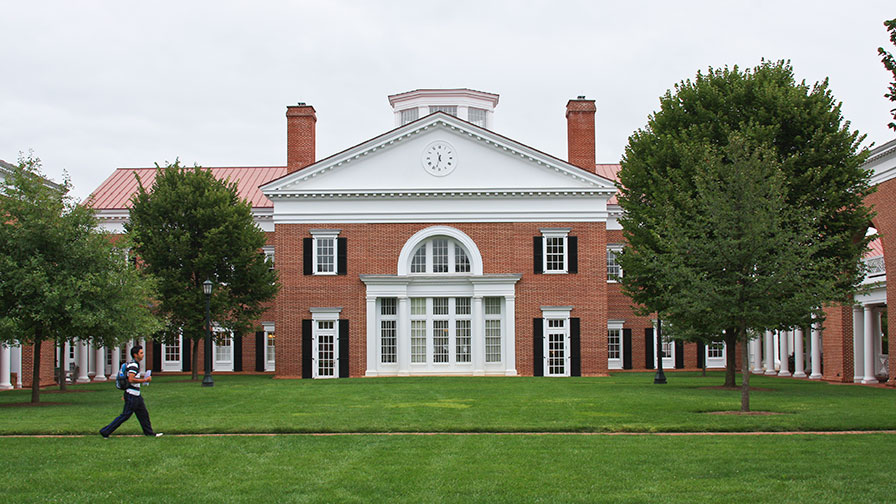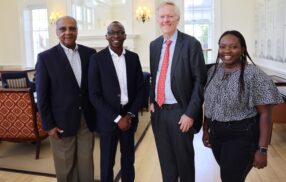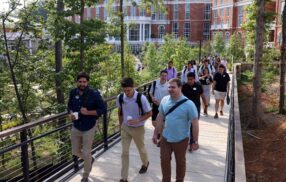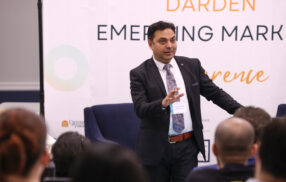
UVA Darden, CEIBS Strengthen Global Entrepreneurial Bonds
By Dave Hendrick
A group of students from the China Europe International Business School (CEIBS) took full advantage of the entrepreneurial ecosystem the University of Virginia Darden School of Business is building locally in Charlottesville, Virginia, and nearby Washington, D.C., during a recent trip to the School. The cohort toured businesses, studied cases and exchanged ideas with Darden students and faculty over the course of the weeklong program.
The CEIBS Entrepreneurial Ecosystems program, which was hosted by Darden’s Center for Global Initiatives, aims to provide CEIBS students with a deep dive into the development and growth of entrepreneurial ventures in the U.S., while also strengthening Darden’s bonds with an international partner school and its community.
CEIBS students were able to explore the specifics of starting and running an entrepreneurial venture, with courses devoted to everything from developing an entrepreneurial network to executing a term sheet. Amid the coursework, students toured successful ventures in the Charlottesville and Washington, D.C., area and heard from a slew of successful entrepreneurial Darden alumni.
The program kicked off with a particularly relevant case study. Students learned of the U.S. growth of Tranlin Inc., a China-based agribusiness and consumer products company that recently announced plans to put down significant roots in the U.S.
The company, led by CEO and Chair Jerry Peng (MBA ‘03), recently broke ground on a $2 billion manufacturing plant outside of Richmond, Virginia. The project, which will eventually employ 2,000 people, is considered one of the largest Chinese greenfield manufacturing investments in the country.
At a session led by Tranlin Chief Financial Officer Jill Douthit (MBA ‘03) and Director of Strategic Development and Corporate Secretary Yue Zhu (MBA ‘14), the corporate leaders walked students through the complexities of international investment, from finding the perfect plot of land to overcoming preconceived notions about the environmental stewardship of a Chinese company.
Addressing the counterintuitive nature of a Chinese manufacturer opening a major U.S. plant, Douthit noted that U.S. consumers used seven times as much volume of paper products as their Chinese counterparts. Moreover, paper products become costly when shipped overseas, and energy costs tend to be substantially lower in the U.S.
“The point here is that when you are looking at a business, you need to look at the customer, the supply, and everything in between,” said Douthit.
Part of the company’s value proposition focuses on its environmental impact, with the company using no trees as raw material and promising to convert the byproduct of the paper-making process into organic fertilizer. Zhu asked students what they imagined the initial reaction was to claims of an environmentally progressive Chinese paper company.
“Impossible,” said one.
“Too good to be true,” said another.
Zhu said the company worked to combat the skepticism by being completely open and transparent with Virginia officials, inviting them to study all steps of the proprietary process and to visit a plant in China, in the middle of summer, while the facility was operating at full capacity.
Indeed, the Virginia plant, on which officials broke ground in October, has been lauded at the top levels of state government as ideal international economic development.
Experiencing Darden’s Case Method
Among the various cases the CEIBS students worked during their time at Darden included the complex case of the planned expansion of the Salinas Y Salinas tostada and tortilla factory in a working-class community southeast of Los Angeles. The case, which focuses in large part on whether a loan officer should grant a loan to fund the factory expansion, involved standard questions of credit-worthiness and cash flow while also wrestling with issues of unique cultural tendencies and efforts by financial institutions to tap into historically underserved markets.
Professor Greg Fairchild, one of the authors of the case, led the CEIBS students through the pros and cons of issuing a conventionally risky but potentially rewarding bank loan to fund the expansion of an entrepreneur’s dream.
The business showed healthy cash flow and strong margins, but operated in an increasingly competitive environment. Moreover, the Hispanic owners had not always been conservative stewards of their personal income. Adding to the complicated cultural context of whether to issue a loan, the Hispanic loan officer knew that a loan could lead to more business in a community with a history of loyalty to the institutions that served them.
In a sign of the thorniness of the dilemma, the students — some of whom worked in bank financing — were split down the middle when asked whether the loan officer should approve the loan.
Entrepreneurship in Washington, D.C.
The CEIBS students wrapped up their week in the Washington, D.C., area, engaging with leaders from the Center for Innovative Technology (CIT), taking in a panel discussion led by corporate adviser and former Virginia Secretary of Commerce and Trade Jim Cheng (MBA ‘87) and learning about new ventures at the global business incubator 1776.
At the CIT, a nonprofit organization that aims to accelerate innovation and entrepreneurship throughout Virginia, Tom Weithman, managing director of the seed-stage venture fund CIT GAP Funds, said the organization carefully vets investments for the likelihood of positive results before moving forward.
“GAP investments are all about outcomes,” said Weithman. “We receive a lot of demand from the community for funding and really look for leadership teams with integrity, passion and a high level of coach-ability. Of the 500-plus companies we review, we invest in 15 to 20.”
Students peppered all of speakers with questions, looking for pieces of advice or insights to help as they think about their own businesses or future business expansion. One student asked for the most important things to keep in mind when doing business or making investments internationally.
“First, you have to consider culture,” said Terry Hsiao, CEO of Hook Mobile. “You have to have a good understanding of the cultural differences in the places you are working. Second, you have to be attentive to regulation. Even the large companies have had a hard time in other markets. And, third, you really have to understand business practice — how the local people do business. At the end of the day, you have to learn. You have to know how to talk to people and before you know how to do that, you have to learn how to listen to people.”
The panelists, led by Jim Cheng, also all made a point of reminding the students to think about what they really want to do and accomplish, through their businesses or the opportunities their businesses afford them after making money.
“We are entrepreneurs for a reason — we want to support ourselves and our families — but after that you want to think about what you can do as an entrepreneur,” Cheng said. “The things that you can do afterwards are very satisfying, whether you are on the board for a nonprofit, share your learnings through education programs or mentor new entrepreneurs. It is all a big part of the entrepreneurial ecosystem, which helps us all be successful.”
The University of Virginia Darden School of Business prepares responsible global leaders through unparalleled transformational learning experiences. Darden’s graduate degree programs (MBA, MSBA and Ph.D.) and Executive Education & Lifelong Learning programs offered by the Darden School Foundation set the stage for a lifetime of career advancement and impact. Darden’s top-ranked faculty, renowned for teaching excellence, inspires and shapes modern business leadership worldwide through research, thought leadership and business publishing. Darden has Grounds in Charlottesville, Virginia, and the Washington, D.C., area and a global community that includes 18,000 alumni in 90 countries. Darden was established in 1955 at the University of Virginia, a top public university founded by Thomas Jefferson in 1819 in Charlottesville, Virginia.
Press Contact
Molly Mitchell
Associate Director of Content Marketing and Social Media
Darden School of Business
University of Virginia
MitchellM@darden.virginia.edu





